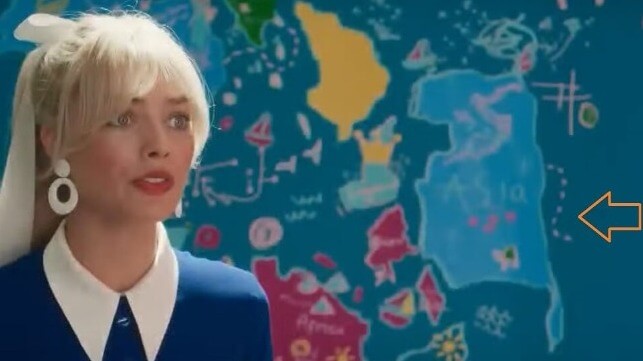Vietnam Bans "Barbie" Movie Over Depiction of Chinese Maritime Claims

The government of Vietnam is sensitive to media depictions of China's excessive maritime claims in the South China Sea, which overlap the Vietnamese EEZ. When a foreign film depicts China's "nine-dash line" claim to its neighbors' waters, Vietnam bans the movie - like the new Warner Brothers "Barbie" film.
In 2016, the Permanent Court of Arbitration at The Hague ruled against Chinese claims to sovereignty over most of the South China Sea, backing a 2013 case brought by the Philippines. The court said China’s claims of historic rights within the nine-dash line were without legal foundation. China refused to acknowledge the ruling and has proceeded as though it never occurred.
On its face, "Barbie" might not seem to have much to do with a maritime boundary dispute in the South China Sea, or any other geopolitical question. However, one scene includes an abstract, stylized illustration of a world map in the background - and this map includes a curving, dashed line extending out from a region labeled "Asia." This line was ample reason for the Vietnamese authorities to ban the film.
"Barbie" is not the first American film to insert and retain a map with a Chinese-aligned depiction of maritime boundaries in the South China Sea. The animated film "Abominable" featured a nine-dashed line in a map labeled "Our trip across China" (below). The action movie "Uncharted" contains a short scene with a map illustration that prominently shows China's nine-dash line claim. "Abominable" was banned by Vietnam, the Philippines and Malaysia over this creative choice, and "Uncharted" was banned by Brunei, Malaysia, Taiwan, Vietnam and the Philippines.

The depiction of the nine-dash line claim in "Abominable" (red X) (fair use)
None of the three films' producers removed the brief depictions of the nine-dash line, choosing to forego access to these Southeast Asian markets instead.

that matters most
Get the latest maritime news delivered to your inbox daily.
China's theatrical film market is the second-largest globally, and Chinese censors govern access to about 20 percent of the world's moviegoers. This is a $4.5 billion market, even after the impact of the Chinese COVID crackdown, and it has been a source of growth for Hollywood - and insiders say that China's government has a strong influence on U.S. film content.
The U.S. Department of Defense recently adopted a policy of non-cooperation with U.S. filmmakers who agree to censor their work at the request of Chinese authorities. According to Politico, the policy change likely came after studio executives attempted to remove Taiwanese and Japanese flag patches from Tom Cruise's flight jacket in the film "Top Gun: Maverick" - an apparent nod to Chinese government sensitivities. The studio's decision was reversed, the Taiwanese flag was reinstated, and the film lost a Chinese investor and access to the Chinese theater market.
